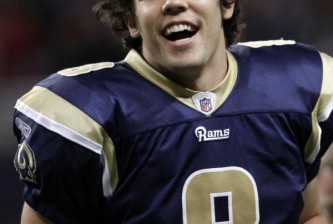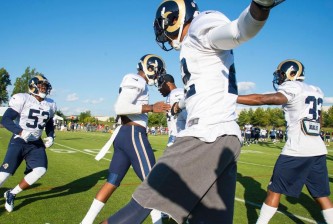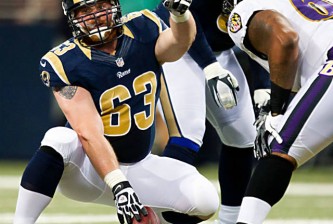Bill Coats’ latest dispatch from Around the Horns contained this tiny nugget that sounds innocuous enough by itself, but when considered in context, continues to round out our portrait of Coach Spags in his first year with the Rams:
“You just keep talking about it and keep looking at it; you’ve got to consider everything,” Spagnuolo said.
By “everything,” is that including the possible return of Marc Bulger for Week 17? The team still hasn’t placed him on IR, even though he has not traveled in weeks, in effort to do as the doctors have ordered and keep weight off the fractured tibia. No doubt he would like to come back and play, and prove (presumably to Rams brass that haven’t already made up their minds to cut him this offseason) that the starting job is still his to lose. I’ve heard speculation — not necessarily “informed” speculation, but chatter at least — that this is still a possibility. If so, it’s a clear reason why Spagnuolo would not be in a position to declare Null the man right now.
The obvious question is “Why?” Does Bulger really have anything to prove? And do the Rams really have anything to gain? But the biggest question is, what kind of coach would allow this wounded duck to continue his prideful, Quixotic quest?
The answer boils down to a debate between two coaching schools of thought: (1) Respect the Hierarchy, and (2) Open Competition.
Respect the Hierarchy?
The rules of “Respect the Hierarchy” state that your #1 guy (Bulger) is always your #1 guy, and will play unless absolutely incapacitated. In that case, then your #2 guy (Boller) plays and we are not to be critical of him, because after all, he’s just our #2 guy and we’re all waiting for our #1 guy to come back. Our #3 guy (Null) will only play as long as #1 and #2 are so critically incapacitated that they have either (a) lost a limb or (b) under medical quarantine.
A believer in the hierarchy will be very uncomfortable playing the #2 guy, especially at quarterback, because he considers it a very slippery slope to introduce a different voice in the huddle, and a different face for fans. A believer in the hierarchy is also a delegator — his #1 guy is the coach’s delegated leader of that position, and to upset the order of things by playing the #2 is to see a part of the coach’s leadership base crumble. It takes a momentous event — a Judas-level betrayal of trust — to upset the hierarchy altogether, and have the #2 or the #3 become the #1.
Dick Vermeil is a classic Hierarchy coach. The football team is his extended family, each person with their important role and status, players and coaches alike. Some players will be put on a track to “graduate” to starting roles, others will be asked to “mentor,” and everyone is expected to play nice.
Open Competition?
The rules of “Open Competition” are simple — may the best man win. Talent evaluation and job auditions don’t stop in training camp, they continue throughout practices, and throughout the season. Some coaches in this mold will “ride the hot hand,” others will create a platoon or come up with other inventive ways to try and maximize the talent on the playing field. But the competition is not always truly “open” — the coach controls the opportunities for these competitions to suit his own needs, and the needs of the team (usually in that order).
A coach who believes in open competition sees himself as the eye of the hurricane — the gravitational center that keeps swirling chaos in order. This type is not a delegator, and is often called a “control freak.” No ego is tolerated that is bigger than his, nor any voice in the locker room louder than his.
Bill Parcells was famous for using this philosophy as a weapon in the locker room. Players live in a state of constant fear for their jobs, and acrimony or animosity in the locker room is not only tolerated, it might be encouraged — as long as the ultimate expressions of rage can be inflicted against the opposing team on Sunday.
(The truest believer in Open Competition I ever saw was Steve Spurrier. But then again, his case study is the classic example of a state of mind that works in the college game but absolutely does not translate to grown men in the pros.)
Looking at the Rams’ recent past, I believe Scott Linehan was at heart a Hierarchy guy who lost his way in season three, notably when he benched Bulger. The players openly revolted at his pathetic attempt to become a fearmonger, and correctly predicted that his job was in far more danger than theirs. Haslett was more of a wildcard, and did succeed in rocking the boat by demoting several entrenched veterans. Ironically, at season’s end, it was Haslett whom the players supported via a petition to the front office.
It’s also worthy to note that, in general, the herd of fans in talk radio, the internet, and armchairs everywhere sympathize with the “Open Competition” philosophy. It’s simpler, and since they don’t have to deal with the leadership issues of actual people in the locker room, there’s really no downside to venting about how much one guy sucks and another guy ought to take his place.
Spagnuolo has struck me as a believer in the heirarchy, but one who is attuned to the reality of his roster, and is not averse to having guys compete for certain spots. The team’s decision to part ways with players such as Chris Draft, Pisa Tinoisamoa, and fan favorites like Joe Klofenstein suggest that they will use competition to weed out the unwanted. Likewise, the Jason Smith/Adam Goldberg battle for starting time in the first two months showed how he believes in it as a tool to sharpen talent and build depth in a unit. However, in his steadfastness to Marc Bulger since day one, Spags has held up a firm hierarchy and has not wavered from it.
Asking Spagnuolo to commit to Null, still his #3 guy at heart, is not a decision the coach will make lightly. And if he does commit to Null, I would expect a face-saving announcement that places Bulger officially on the IR, and gives Boller some sort of lingering and temporarily uncurable malady that lasts three more weeks.
The hierarchy must be preserved, even when the names change places. Like the old saying goes: “The king is dead, long live the king!”






















